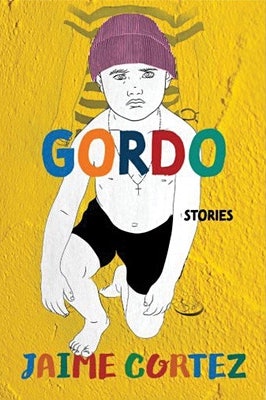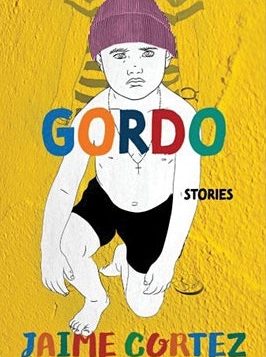 GORDO
GORDO
by Jaime Cortez
Grove Press, Black Cat. 208 pages, $16.
JAIME CORTEZ is a beloved Bay Area artist known for the whimsy and satirical edge in his drawings, graphic novels, sculpture, poetry, and performance. A gentle, uncompromising fierceness emanates from his work as he explores Chicano queerness. The artist also works in philanthropy as a program officer for a foundation. He grew up in California’s Central Valley, and his new collection of short stories, Gordo, is set in this region’s agricultural worker camps in the 1970s. These are not fictionalized narratives of hardscrabble destitution but ebullient tales about the chubby, effeminate Gordo and his friends. The joyous humanity of Cortez’ characters challenges the familiar tropes of migrant workers, as the children play and scuffle together and join their parents in the garlic fields.
The stories often feature Gordo—a “sissy boy” coming to terms with his otherness. One hilarious chapter details his father bringing home a wrestling outfit with a punching bag and jumprope to toughen him up. Gordo loves the glittering mask and slippers and is thrilled to sing and skip—all to his father’s dismay. In another story, Gordo is invited into the Saturday night men’s ritual of listening to ranchera music and drinking by a campfire. The boy prefers being on the outside of the circle, wanting to remain invisible. The men are funny, tender, scary, and increasingly animated as they drink. Gordo’s wish: “With them, maybe I can learn how to be a normal boy, a real boy, instead of me.”
There is generosity in sharing meager resources whenever a new family arrives on foot, hoping to find work. Chicanos and undocumented “beaners” work together and support each other, but Gordo and his friends are terrorized by midday raids by Immigration and Naturalization agents. People disappear, never to return, leaving their belongings behind. Weddings and funerals are celebrated with much gusto. Handsome grooms in their “long-sleeve collared shirts” and “slacks, worn tight as a tourniquet” stir Gordo’s burgeoning desire. Back home in Mexico, visiting his Nana, he touches a corpse for the first time and prays the rosary with her before jumping into his parents’ car for the meandering processional circling the soccer stadium and stopping off at the jail on the way to the cemetery.
Gordo’s family eventually moves from the worker’s camp to the nearby town of Watsonville to work in food processing plants. They have their own house now, with a “flush toilet, a lawn, and a telephone.” Next-door lives Alex, a recluse who has an accident while tree trimming. When Gordo’s family runs over to help, the boy realizes his neighbor is actually a woman—something everyone else knew but never spoke about. Alex brings home a girlfriend but becomes physically abusive. Before long, Gordo and his mother hatch a plot to liberate her!
Other gloriously idiosyncratic characters populate Cortez’ fictional universe. Fat Cookie runs away with her mother’s boyfriend; the Los Tigres teenage brothers outdrink most of the men; and Raymundo the “fag” grows out his hair the summer after sixth grade, proclaiming: “It’s just my style.”
With this new collection of short stories, Jaime Cortez joins important queer voices such as Ocean Vuong (On Earth We’re Briefly Gorgeous) and Robert Jones Jr. (The Prophets) as part of the next generation of writers reframing the intersectionality of what it means to be LGBT and American today. His effervescent writing, filled with humor, drama, and pathos, invites readers into the lives of those not often seen in our society. His characters are imbued with grace, perseverance, and resilience. ____________________________________________________






